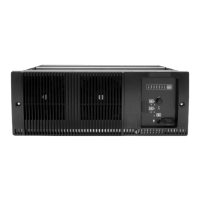TB9100/P25 CG/P25 TAG Installation and Operation Manual Installation 47
© Tait Limited March 2014
Notice The connections shown in Figure 3.3 assume the reciter is
powered via the subrack. If the reciter has been removed from the sub-
rack, you must supply power to it (and the CTU) separately.
Notice The CTU is common to TB9100 and TB8100 base stations:
some of its connectors and controls are not used with a TB9100. Refer
to the Calibration and Test Unit Operation Manual for detailed informa-
tion about connecting and operating the CTU.
Confirming Operation
To ensure that the base station is working correctly before site installation,
you may want to apply power to check for proper operation.
Notice Make sure that the RF output is connected to a suitable atten-
uator or dummy load. Do not remove the load while the PA is transmit-
ting.
Applying Power 1. Before turning the base station on, carry out the following tasks:
■ check that the PMU is turned off – ensure that the AC and DC
module power switches are both set to ‘Off’ (refer to Figure 4.5
on page 87)
■ 12V PA only: check that the battery supply lead is disconnected
(refer to “Replacing a Power Amplifier” on page 103)
■ remove the front panel (refer to “Preliminary Disassembly” on
page 96)
■ check that all looms and cables at the front and rear of the base
station are fitted correctly
■ check that all connectors are secure
■ refit the front panel – ensure that it is fitted correctly so that the
fans will operate if needed (refer to “Final Reassembly” on
page 115)
2. Apply power by turning on the PMU, or by connecting the battery
supply lead to the 12V PA.
3. Check that the base station powers up correctly:
■ check that the cooling fans in the front panel turn on in the
correct order after power-up: the PMU fan will run first, followed
by the PA fan and then the reciter fan; each fan will run for about
five seconds and then switch off (note that the PMU fan is not
fitted to a 12V PA base station)
■ check that the LEDs on the control panel come on after about five
seconds, and then go off (refer to “Control Panel” on page 79)
■ at this point you can safely press the speaker and microphone
button and check that they are operating correctly

